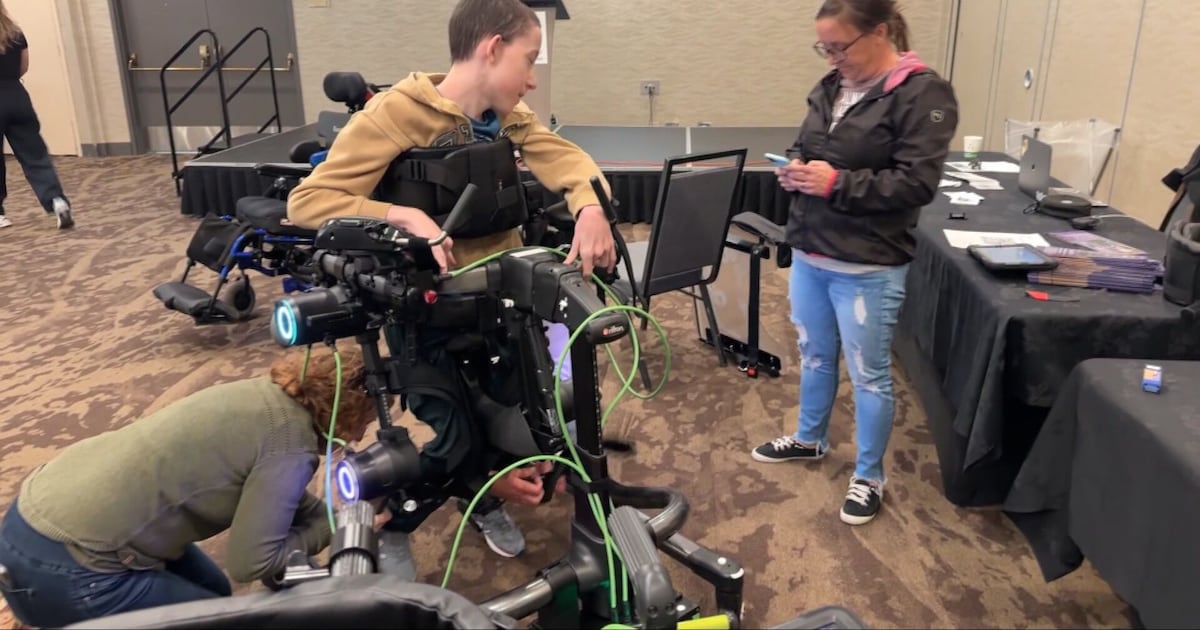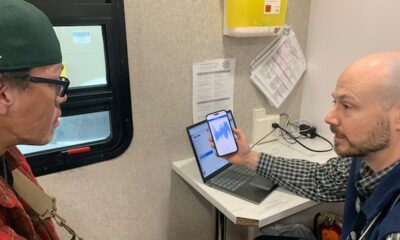Health
Families Explore Innovations at Calgary’s Neuromotor Resource Expo

Families coping with cerebral palsy and other neuromotor conditions came together on March 2, 2024, in Calgary for the Neuromotor Resource Expo. This one-day event, organized by Cerebral Palsy Kids and Families as part of its 75th anniversary celebration, showcased over 50 local organizations. Participants included clinicians, adaptive recreation specialists, and robotics researchers, all united in their mission to support affected families.
Sheralee Stelter, the executive director of the hosting organization, emphasized the expo’s purpose: connecting parents and caregivers with essential services that can often be challenging to identify. She stated, “We wanted to bring together vendors and people from the hospital and robotics labs and brain-computer interface and resources that we supply to our families. It’s truly incredible how technology is changing the lives of our kids, living it for the better.”
Innovative demonstrations at the expo included robotic walking devices and brain-computer interface systems. These technologies allow users to control devices through their thoughts, a concept that was once confined to science fiction. Elizabeth Condliffe, a researcher at the University of Calgary and leader of the Pediatric Onset Neuromotor Impairment Lab, noted the rapid advancements in this field. She remarked, “There are now ways to facilitate walking for people who cannot walk. All of these devices have hit the market in the last 10 years, and two of them in the last five years.”
Community Support and Lifelong Independence
Condliffe highlighted significant improvements in the quality of life for adults with cerebral palsy, stating that they can now achieve near-normal lifespans. Nevertheless, challenges remain in ensuring full participation in society. She stressed the importance of community support, stating, “We need to do a better job of making sure that people have the supports they need to live the lives they want (like) competitive employment, living independently and preventing preventable secondary health conditions.”
Among those showcasing the potential of technology was Alex Mertens, a 26-year-old who utilizes a Trexo robotic walking device. “It has taken away all my chronic knee pain,” she shared. “I’m able to go ride my bike, go rock climbing — I’m able to do a whole bunch of things now that my knee is better.” Mertens expressed how walking upright has transformed others’ perceptions of her. “When they just see me walking and the wheelchair is not there, they don’t question, ‘Are you in a wheelchair?’ It makes me feel like a regular person that can walk — just with the help of a device.”
Now a kinesiology student at Mount Royal University and actively involved with Condliffe’s lab, Mertens aspires to help others with disabilities engage in physical activities. She stated, “All kids should have this freedom to walk.”
A Journey of Progress
For Stelter, the event represented a significant milestone in the journey of the cerebral palsy community, especially as she reflects on her own son’s experiences. Now 30 years old and living independently, her son faced a different reality during his childhood. “Robotics didn’t exist when he was little,” she noted. “As you can see around here today, there are kids in these devices walking around — it’s incredible.”
The Neuromotor Resource Expo not only showcased technological advancements but also fostered a sense of community among families. It provided a platform for sharing knowledge, resources, and hope, illustrating how innovation and support can transform lives. As families left the expo, they carried with them the promise of a brighter future powered by technology and community collaboration.
-

 World4 months ago
World4 months agoScientists Unearth Ancient Antarctic Ice to Unlock Climate Secrets
-

 Entertainment4 months ago
Entertainment4 months agoTrump and McCormick to Announce $70 Billion Energy Investments
-

 Lifestyle4 months ago
Lifestyle4 months agoTransLink Launches Food Truck Program to Boost Revenue in Vancouver
-

 Science4 months ago
Science4 months agoFour Astronauts Return to Earth After International Space Station Mission
-

 Technology2 months ago
Technology2 months agoApple Notes Enhances Functionality with Markdown Support in macOS 26
-

 Top Stories3 weeks ago
Top Stories3 weeks agoUrgent Update: Fatal Crash on Highway 99 Claims Life of Pitt Meadows Man
-

 Sports4 months ago
Sports4 months agoSearch Underway for Missing Hunter Amid Hokkaido Bear Emergency
-

 Politics3 months ago
Politics3 months agoUkrainian Tennis Star Elina Svitolina Faces Death Threats Online
-

 Politics4 months ago
Politics4 months agoCarney Engages First Nations Leaders at Development Law Summit
-

 Technology4 months ago
Technology4 months agoFrosthaven Launches Early Access on July 31, 2025
-

 Top Stories1 week ago
Top Stories1 week agoFamily Remembers Beverley Rowbotham 25 Years After Murder
-

 Entertainment4 months ago
Entertainment4 months agoCalgary Theatre Troupe Revives Magic at Winnipeg Fringe Festival





















